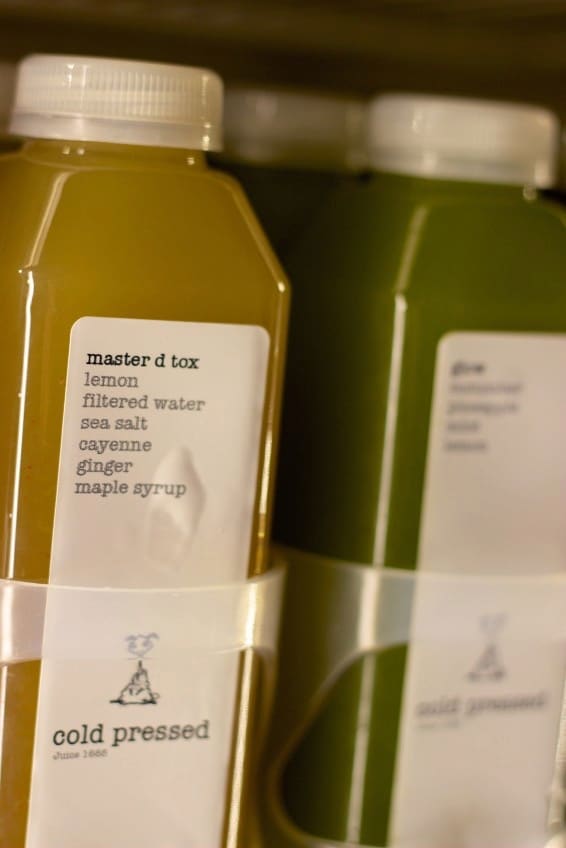Whether you’re a yoga guru on a cleanse, a gym rat looking for antioxidants, or just perusing the beverage options at the corner coffee shop, chances are you’ve seen cold-pressed juice. This trend has caught the attention of health-conscious people looking to get their fruits and greens in a quick, drinkable form. Bottles can be found anywhere from specialty juice shops to chain grocery stores.
But why are we infatuated with liquefying our fruits and veggies? Are the health benefits worth the hype? Let’s take a closer look.
 First things first – what does “cold-pressed” mean, anyway?
First things first – what does “cold-pressed” mean, anyway?
Cold-pressed juice is made with a hydraulic press that uses thousands of pounds of pressure to extract the maximum amount of liquid from fresh fruits and vegetables. No additional heat or oxygen is used in the process, meaning that no nutrients are lost in the heat of traditional pasteurization.
But cold-pressed juice in its raw form only has a shelf life of three to four days before microbes begin to spoil it, and it can pose some pretty major food safety risks, especially for young children or women who are pregnant.
To solve this problem, most of the cold-pressed juices on the market have undergone a pasteurization method known as high pressure processing (HPP). In HPP, already-bottled juices are submerged in cold water under high pressure, which kills pathogens and increases the shelf life from three to five days to a whopping 30 to 45 days.
Wait – is that price tag for real?
There’s no getting around the steep price tag on these products – cold-pressed juices are typically $5-$10 per single-serve bottle, so purchasing several juices per week (or per day) could send your grocery budget through the roof. However, grabbing a juice once in a while could be a healthful splurge. But healthful enough to warrant the price? Well …
But cold-pressed juice is super healthy, right?
It depends on how you look at it. Fruits and vegetables are great sources of vitamins, minerals, and antioxidants (such as flavonoids). Since any 100% juice delivers fruits or vegetables, it’s a quick way to get a lot of these compounds in one sitting. Some folks claim that, since cold-pressed juices specifically are exposed to minimal heat and air, they’re able to hold onto more vitamins, minerals, and enzymes present in the whole fruit. However, there is currently no published research to support these claims.
On the other side of the coin, it’s important to remember that a juice-focused diet does not provide all of the nutrients our bodies need. Most fruits and vegetables contain little to no protein or fat, and the juicing process removes much of the fiber found in whole produce (which many of us are neglecting in our diets). If a person consumes multiple bottles of juice per day, calories can quickly add up, without the feeling of fullness you’d get from a whole fruit or vegetable. Think about it this way: For most people, it would be next to impossible (or at the very least, uncomfortable) to eat nine apples or 12 carrots in one sitting — that’s about three pounds of food. The average cold-pressed juice packs the liquid from that amount of produce into one 16-ounce bottle. Because liquid calories may not provide us with the same feelings of fullness as solid foods, you could end up eating more to satisfy your hunger.
 All of my friends are juice-cleansing. Should I join in?
All of my friends are juice-cleansing. Should I join in?
Many individuals use juice cleanses as a form of ‘detoxifying’ the body, but it’s not clear that this process has any sustainable benefits. There are some other pretty good reasons to avoid ‘cleanse’ or ‘detox’ diets as well. And let’s not forget that we have entire organs devoted to detoxification: a healthy liver and kidneys are more than capable of handling the undesirable substances our body takes in!
So what’s the bottom line?
The science behind the benefits of cold-pressed juice over other 100 percent juice is lacking. So far, there’s no proof that the beverage actually delivers special health benefits. However, if you’re looking for ways to get more fruits and vegetables into your diet in a fast, easy, and portable way, a bottle of any 100 percent juice, including cold-pressed juice, could be a good option once in a while. If you love juice, keep drinking it. Just be sure to balance it with other healthful foods and beverages.

 First things first – what does “cold-pressed” mean, anyway?
First things first – what does “cold-pressed” mean, anyway? All of my friends are juice-cleansing. Should I join in?
All of my friends are juice-cleansing. Should I join in?